- Home
- J. R. Ellis
The Royal Baths Murder Page 8
The Royal Baths Murder Read online
Page 8
‘Wonderful! Yes, they’re very impressive. I think Italian craftsmen came to lay them.’
They began their second search in the hot room, where Penrose had met his death. Apart from the stone benches at the side of the tiled floor, the room was bare. The steam room, devoid of steam today, and the adjoining cold plunge pool, with its greenish water, yielded nothing. They spent some time in the short corridors looking for any ways of getting out. The windows down here below ground level were high, and on the outside were at street level. Through the frosted glass, Oldroyd could see the occasional pedestrian passing by. It wouldn’t have been easy for anyone to get up to those windows, let alone escape on to a busy street without being seen. That is, if any of them actually opened.
They reached the changing rooms and examined all the lockers and cubicles. It was from just outside this room that Steve Monroe had removed the wicker basket of towels. Suddenly a strange feeling passed over Oldroyd. He’d seen something the day before that wasn’t right. He hadn’t registered it properly because his mind was on other things. What was it? Frustratingly, the vague memory would not solidify into anything clear. He moved to the swimming pool and gazed at the still water and the blue tiles on the bottom. The pool was an original late-Victorian feature. The thick, curved, white-tiled edges overhung the water. These were good for diving but they made it difficult to get out of the pool. Exits from the water had to be made via one of the sets of metal steps that were attached to two sides of the pool. These were clearly a later addition, being made of shiny stainless steel with the usual curved tubular handles at each side. Oldroyd imagined that they would have originally been made of wood. It was all very unusual and interesting but the search appeared to have revealed nothing about exits or hiding places. Andy joined him.
‘Any ideas?’ Oldroyd asked.
‘No, sir. It’s baffling. It’s the second time I’ve looked round here and it drives you mad. I’ve had another look at the emergency exit but it’s not been tampered with. There’s just no way out of here except back up those stairs.’
‘Right, well, get a team down here to give it another thorough going-over to see if they come up with anything. They might see something we’ve missed.’
It was beginning to sound desperate.
Back at HQ, Oldroyd glanced through some of the newspaper coverage. The press were having a great time with the delicious ironies of a crime writer being murdered in the very town where a crime writing festival was being held and where Agatha Christie herself was discovered after she had disappeared from her home in the 1920s.
Poison Pen Meets Grisly End in Agatha Christie Spa Town
You Couldn’t Make it Up – Real Life Trumps Fiction at Crime Writing Festival
Author Dies in Plot Worthy of His Books
Did Author Plan Own Death as His Last Bow?
The last headline in one of the more lurid tabloids announced the ludicrous notion that Penrose – who was apparently either terminally ill or bankrupt, according to different accounts – had somehow arranged his suicide to look like murder and so have the last laugh over everyone.
‘And so he finally lived out one of his own mysteries,’ said Oldroyd aloud to himself, shaking his head. He knew when a case hit the headlines, he would soon be called in to see his boss, DCS Tom Walker. Matthew Watkins, the generally despised Chief Constable of West Riding Police, always started to get jumpy when the media highlighted a case, and he would immediately get on to Walker, asking what progress was being made, etc. As Oldroyd predicted, the call soon came and he made his way upstairs to Walker’s office.
He actually got on well with Tom Walker, who had risen through the ranks and served many years as a detective in the tougher parts of Yorkshire. He and Oldroyd occasionally met socially. They shared the same beliefs about police work and were both Yorkshire to the core.
‘Have a seat, Jim.’ Walker, a portly man, was sitting at his desk in the bare office, cutting a rather forlorn figure. Oldroyd knew that the old boy really preferred active police work to administration. Walker was stroking his moustache, a sure sign that he was not happy. ‘Well, I probably don’t need to tell you what’s happened. I’ve had the bastard on the phone.’
The ‘bastard’ was Watkins. Much to Oldroyd’s embarrassment, Walker never made any attempt to disguise his contempt for his superior, whom he regarded as a phoney careerist.
‘I never hear anything from him unless there’s something bothering him, and that’s usually to do with publicity that he thinks will reflect badly on him. It’s all about him, the slimy little—’
‘What’s the problem, Tom?’ Oldroyd cut in to pre-empt Walker’s rant.
‘He’s picked up on this murder of the crime writer. He wants to know what leads we have and do we expect a quick arrest and so on. Bloody hell, it’s only the day after the bloody murder, what does he bloody expect?! It’s all because he wants to be seen as the head of a wonderfully efficient force but without doing any of the work, of course. It’s a bloody disgrace.’ He stopped, looked at Oldroyd and then continued almost apologetically. ‘Anyway, how’s it going?’
Oldroyd outlined what they’d done and what they knew so far.
‘Well, that’s a damned good day’s work, in my view,’ said Walker, ‘and I’m going to bloody well tell him so. But you say it’s a puzzle how the bloke was murdered, and you’ve also got a lot of suspects?’
‘I’m afraid so.’
Walker frowned. ‘Sounds like you’ve got a lot to do, then. Just keep me posted. I must admit, it’s a bit of a funny do, isn’t it? Bloody Crime Writing Festival on and one of the writers gets killed. Bloody hacks love it, don’t they? Do you think there’s any connection?’
‘Not directly, but the fact that Penrose was here in Harrogate gave the murderer their opportunity. The killer must be someone with local knowledge, but others would have been involved, and the festival brings in people from all over the country.’
‘Yes, I can see it’s complicated. Well, don’t worry, I’ll keep the bugger at bay. It might be a good idea to talk to the press. You’re good at it, and they like to get the chance to question us. It gives them a sense of power, pathetic as they are.’ Walker paused and looked at Oldroyd again. ‘By the way, we haven’t been out for a drink for a while.’
‘No.’ Oldroyd didn’t mind the occasional social meeting with Walker. He knew how to handle him and keep him off his pet hates. He was interesting to listen to when he talked about his early years in policing. ‘How about next week sometime?’
‘Can’t do that, I’m afraid. The mother-in-law’s coming to stay. Ninety-six and deaf as a post, but I need to be around all the time to help Gillian if her mother needs to be lifted or anything. Maybe the week after.’
An evening was arranged and Oldroyd returned to the office feeling an increased sense of pressure.
Oldroyd decided to hold the press conference at The White Swan. It satisfied his sense of drama and appropriateness, and no doubt that of the reporters too. A table had been set up in the ballroom and he sat behind it, flanked by Andy Carter and facing the ranks of reporters eager for succulent bits of information.
Oldroyd quite enjoyed these press conferences. He played a game with the reporters, which he always won by adroitly staying a few steps ahead. They tried to extract things they could use in their sensationalised reports, and he cleverly frustrated them.
He began, as usual, with an outline of what had happened and an appeal for any member of the public who had information to come forward. He then proceeded to questions.
‘This Poison Pen bloke, he must have had plenty of enemies to get a name like that. Could they all have got together to do him in? You know, like in Murder on the Orient Express?’
‘Well, I agree with your first point,’ replied Oldroyd, smiling contentedly as he enjoyed his control over the assembled reporters, and various recording devices were thrust in his direction. No more scribbling shorthand in notebooks these days. ‘Mr
Penrose was not a popular individual and there are already a number of suspects in this investigation. However, I have to say that the idea of a large number of people taking part in a conspiracy to murder him is extremely unlikely. Murder on the Orient Express is a great story, an ingenious twist on the question of who among the suspects is the killer, but that is not how these things actually happen in my experience, although we do believe more than one person was involved.’
‘Maybe no one was involved, Chief Inspector. If Penrose was dying, as we’ve heard, then he could have arranged his own death to be like one of his stories – you know, his final mystery. He could be having his last laugh at your expense and a final bit of posthumous limelight.’
Oldroyd raised his eyebrows. He was used to elaborate ideas like this from tabloid reporters, who yearned for things to be as sensational as possible. ‘Well,’ he replied, ‘I have to congratulate you on your imagination. Maybe you should try your hand at writing crime fiction. I’m sure they’d welcome you at the festival. But unfortunately the answer is no. It’s not possible that this was a suicide. It’s very difficult to strangle yourself with a rope just using your hands, but even more difficult to dispose of the rope when you’re dead.’
This brought some laughter, but the reporter was undeterred. ‘But could he have arranged for someone to kill him and then disappear, thus creating the mystery?’ The reporter looked very pleased with himself.
‘I see,’ said Oldroyd. ‘Well, not impossible, I suppose, but maybe I could go philosophical for a moment. I’m sure you’ve heard of Occam’s razor, yes?’
The reporter was silent.
‘In essence,’ Oldroyd said, ‘it’s the idea that when solving problems, simple solutions are generally to be preferred to complex ones. In this case there doesn’t seem to be any sound reason to prefer your fantastical notion of an outlandish death involving a disappearing accomplice who has now made themselves a murderer, to the disappointingly mundane idea that somebody just did him in.’
Laughter again, and the reporter was silenced.
‘You mentioned the Crime Writing Festival, Chief Inspector. That will be getting a big publicity boost out of this, won’t it?’ asked another reporter.
‘Maybe,’ said Oldroyd cautiously. He wasn’t sure what was coming next. These people could still surprise or shock him on occasions.
‘So could someone have . . . you know?’
Oldroyd realised what the man was driving at: that someone involved in the Crime Writing Festival had killed Penrose to gain publicity. It was outrageous, and he moved to quash it.
‘I can see why you haven’t spelled out what you mean. The implications of what you’re implying are quite scandalous, so I don’t think we’ll go down that road. In any case, it’s even more incredible than the previous suggestion.’
This caused a hubbub of conversation, and then a female reporter asked a more sensible question. ‘Chief Inspector, you referred to the killer disappearing. Is it true, and do you have any leads on that?’
‘OK. Mr Penrose was murdered in the Royal Baths by an as yet unknown person. We’re not sure at this stage how that person managed to leave the scene of the crime without being seen by the staff at the Baths or by police officers who arrived quite soon after the body was discovered. This trick, or whatever it was, implies that the killer was a local person who had detailed knowledge of the building and knew of a way out that we have so far failed to discover. I would again like to ask at this point for anyone with any information about this or any other aspect of the case to come forward.’
Afterwards Oldroyd felt satisfied, as he usually did, that the press conference had gone well. But as he and Andy returned to HQ, he began to think about some of the ideas the reporters had presented and to wonder whether they were in fact as far-fetched as he’d initially thought.
Could the whole thing have been somehow staged? The three people who had confronted Penrose in the bar that night were all writers or publishers with plenty of style and imagination. How spontaneous was that row in the bar? Had everybody been acting? Maybe there were reasons why Penrose wanted to end his life and to do it in the style of a murder mystery in Harrogate, echoing the strange behaviour of Agatha Christie herself in 1926. The disappearance of the killer could be part of an elaborate trick to fool his audience for one last time.
Penrose’s physical and mental state of mind and his financial affairs would have to be thoroughly investigated, and they would need to delve much deeper into his relationship with those three suspects. As usual, Oldroyd was finding that at the beginning of an unusual case like this, matters became more complex once you began to scratch the surface of the characters and events involved.
Oldroyd and his sister, Alison, were making slow progress up the steep path that zig-zagged through the bracken on the slopes of the western fells of Mid-Wharfedale. Above them loomed the strange and massive sandstone formations collectively known as Simon’s Seat. The day was warm but the sky was a complex mass of heavy cloud and patches of blue, suggesting that the familiar combination of sunshine and showers would be the pattern of the day.
Alison paused and looked back. ‘That’s Parcevall Hall on that hillside,’ she said, pointing across the valley to an ancient manor house surrounded by ornamental shrubs and parkland. ‘I love that place; it’s so beautiful and peaceful. I went on an amazing retreat there once about eastern meditation. It was run by a Buddhist monk from India.’
‘Do they know in the parish that you dabble in the spirituality of other faiths?’ asked Oldroyd mischievously.
‘Some do, some don’t. If anyone voiced any disapproval, I’d tell them to live in the twenty-first-century world with its inter-faith dialogue.’
‘Even old Major Frobisher, or whatever his name is?’
‘Hawkins. Ralph’s OK when you get beneath his crusty, conservative exterior. He’s got a very kind nature, just too rule-bound. Like many religious people.’
The track left the bracken and took a direct line upwards through gullies lined with fruiting bilberry plants.
‘Look at these,’ said Oldroyd, picking the small, dark-purple berries. He popped one in his mouth and enjoyed the strong, tart flavour.
‘Yes, I wish I’d brought a bag,’ said Alison. ‘Bilberry pie is one of my favourites.’
At the summit they sat near the trig point and ate their lunch. They were surrounded by a huge series of millstone grit, flat-topped buttresses, which, from a distance, formed the shape of a giant seat.
‘How are things in Kirkby Underside anyway? How long do you intend to stay?’
Alison replied between mouthfuls of hummus and red pepper sandwich. ‘I’m still on sabbatical.’ Most of Alison’s time as a Church of England vicar had been spent in the inner city and in campaigning on social justice issues. She had moved to the more tranquil rural parish of Kirkby Underside after the death of her husband. ‘I’m taking my time, but it does get a bit tedious occasionally. People get very uptight about things. We have these two readers who are licensed to preach, you know.’
Oldroyd nodded as he munched a slice of pork pie. He was familiar with the structure of the Church of England from his childhood, when he and Alison had been taken to church regularly by their mother.
‘Well, one of them accused the other of stealing material from him to put in his sermons. Can you believe it? It got very unpleasant.’
Oldroyd poured out two cups of tea from a flask, took a drink from one and handed the other to Alison. ‘Actually, that kind of thing has cropped up in this case I’m working on. One suspect claims that Penrose, the victim, stole ideas from her and used them in his own stories. She made no bones about the fact that she hated the man. This stealing of ideas goes deep, doesn’t it? People get more worked up about it than when objects are stolen.’
Alison drank her tea and offered Oldroyd a chocolate biscuit. ‘Yes. Although I was making fun of those church readers, there is a serious aspect to it. People feel violat
ed when ideas and written material are stolen and passed off by someone else as theirs. Something deeply personal has been taken from them.’
‘And it’s unfair, isn’t it?’ continued Oldroyd. ‘Like plagiarism in academic life. It’s cheating and it’s benefitting from somebody else’s work and imagination.’
‘Indeed. Which makes the victim extremely angry.’
‘And capable of violence?’
‘Yes, though I’m pleased to say that my readers have not come to blows as yet.’ Alison laughed as she got up. ‘Shall we move on? Look at that incredible view.’
Before they began their descent, they gazed out towards Upper Wharfedale and the distant fells of Great Whernside and Buckden Pike. The path passed across heather moorland, which would be purple in another month or so, and then came down through woodland to the River Wharfe. The last stretch of the route was a beautiful meander among woods beside the river back to Appletreewick, where the car was parked.
Oldroyd had done this walk many times, and just before the path entered the woodland, he liked to pause and look at a poignant memorial to a young woman who had died of cancer back in 1960. She had been an underwater diver and had managed to spend time exploring deep pools in the river in the last months before she died.
There it was, the little stone tablet by the side of the path, rather worn now but still clearly legible. On this occasion reading the words made him think. He was quiet and distracted for the remainder of the walk. Could that really have been what happened? He shook his head and dismissed the idea as impossible. Surely?

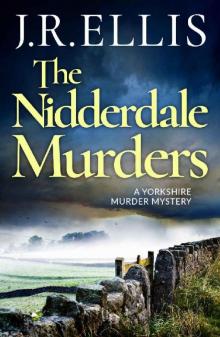 The Nidderdale Murders (A Yorkshire Murder Mystery)
The Nidderdale Murders (A Yorkshire Murder Mystery)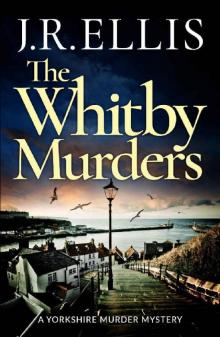 The Whitby Murders (A Yorkshire Murder Mystery)
The Whitby Murders (A Yorkshire Murder Mystery)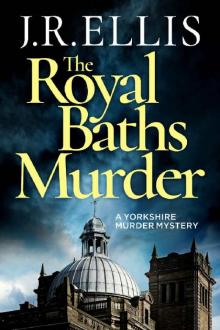 The Royal Baths Murder
The Royal Baths Murder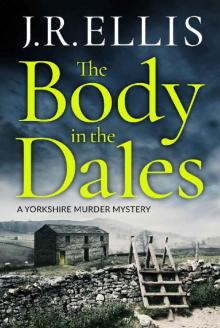 The Body in the Dales
The Body in the Dales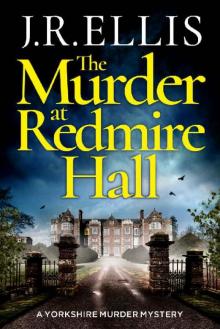 The Murder at Redmire Hall
The Murder at Redmire Hall